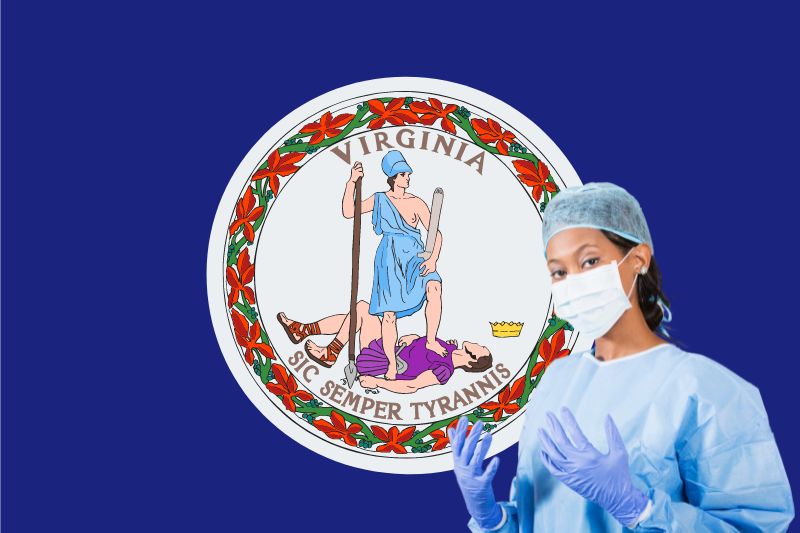Table of Contents
- 1. Virginia Surgeons 2024 Buying Guide to Medical Malpractice Insurance
- 2. 2024 Medical Malpractice Coverage and Rates for Virginia
- 3. Virginia Estimated Malpractice Insurance Rates by Specialty
- 4. Get Medical Malpractice Insurance Quotes from A-rated Carriers Serving Virginia
- 5. Types of Professional Liability Insurance for Virginia Surgeons
- 6. Understand Your Risk of Malpractice Claims in Virginia
- 7. Tort Reform in Virginia
- 8. Virginia’s Damage Caps on Medical Malpractice Lawsuits
- 9. Virginia’s Statute of Limitations for Medical Malpractice Claims
GET A QUOTE
Medical Malpractice Insurance
1. Virginia Surgeons 2024 Buying Guide to Medical Malpractice Insurance
If you are a surgeon needing medical malpractice insurance in Virginia, SURGPLI will work for you as your only trusted insurance broker. Our advisors have deep knowledge of Virginia’s medical malpractice insurance marketplace, plus they stay up-to-date on the state’s legislation and tort reforms that affect rates and coverage requirements for your surgical specialty. Use the information in this 2024 Buying Guide to get ready to discuss your medical malpractice insurance needs with a SURGPLI advisor.
Virginia surgeons carry coverage with some of the highest medical malpractice limits in the country, due to the state’s annual increase on damage caps through July 2031. The good news is that the state’s medical malpractice rates are competitive among carriers. And even better, an independent SURGPLI advisor will work with you to easily shop for strong coverage with the best carrier and rate for your surgical specialty.
2. 2024 Medical Malpractice Coverage and Rates for Virginia
Surgeons in Virginia are not required by law to obtain medical malpractice insurance. However, in light of Virginia’s annually increasing damage caps, SURGPLI advises surgeons – especially in high-risk specialties – to secure and maintain strong liability coverage. A SURGPLI advisor will help you find the best coverage to reduce risk to your practice and protect against personal financial loss if sued for malpractice.
3. Virginia Estimated Malpractice Insurance Rates by Specialty
Each carrier uses its own proprietary methods of setting rates, which vary among carriers and specialties. Each malpractice insurance policy is underwritten individually, but the following are approximate rates across all Virginia locations to give you an idea of costs by high-risk specialty.
| Specialty | Approximate Claims Made Rate | Approximate Tail Rate | Approximate Occurrence Rate |
|---|---|---|---|
| General Surgery | $50,000 | $100,000 | $60,000 |
| Obstetrics and Gynecology | $80,000 | $160,000 | $90,000 |
| Orthopedic Surgery No Spine | $40,000 | $80,000 | $50,000 |
| Orthopedic Surgery Spine | $75,000 | $150,000 | $85,000 |
| Plastic Surgery | $50,000 | $100,000 | $60,000 |
| Bariatric Surgery | $80,000 | $160,000 | $90,000 |
| Neurosurgery | $90,000 | $180,000 | $100,000 |
*Using the VA standard limits of $2,600,000 Each Claim per year in coverage
Virginia healthcare facilities typically require surgeons who want admitting privileges to carry medical malpractice insurance with liability limits that match the cap on damages.
Also, if you need tail insurance coverage as a contracted surgeon changing jobs, you likely need to match the minimum required by your hospital. SURGPLI specializes in both medical malpractice insurance and tail insurance coverage for Virginia surgeons, so contact us for a personalized quote based on your unique needs.
4. Get Medical Malpractice Insurance Quotes from A-rated Carriers Serving Virginia
Surgeons in Virginia have many good options for medical liability insurance. SURGPLI recommends carriers rated “A” by A.M. Best. These companies are A-rated because of their long-term financial solvency and a history of providing robust legal support for Virginia surgeons. Some of the top carriers include:
- The Doctors Company
- MagMutual
- MedPro Group
- ProAssurance
- Coverys Group
- Liberty Mutual Group
5. Types of Professional Liability Insurance for Virginia Surgeons
Here is an brief overview of the most common types of medical malpractice insurance for surgeons in Virginia:
Claims Made Insurance
Claims-made malpractice insurance provides coverage if the policy is in effect both when the incident took place AND when the claim is filed. If a claim is filed after the end of the policy date, the claim is NOT covered. With a claims-made policy you need tail malpractice insurance, which is a separately purchased insurance policy or endorsement, to make sure you have full protection. Claims-made insurance policies “step up” as they mature, so the first year rate is lower than subsequent years.
Occurrence Insurance
Occurrence malpractice insurance provides coverage for incidents that occurred during the policy year, regardless of when a claim is reported to the carrier. Occurrence policies are more costly at the start of the policy, but the rate does not “step up”, and there is no need for tail coverage when the policy ends.
Tail Insurance
Since most malpractice insurance policies are underwritten on a claims-made basis, you will be exposed to a lawsuit if a former patient files a claim against you and you do not secure tail coverage. When you are preparing to leave your employer, you should seek tail coverage options with an independent broker like SURGPLI. Tail insurance covers you for a specific time period. The new employer’s policy is not going to cover you for prior acts of a former practice, hence tail coverage is needed. Read more about tail malpractice insurance.
Reach out to an experienced SURGPLI broker who will do the work for you to find a tail policy at a great price.
6. Understand Your Risk of Malpractice Claims in Virginia
Even the most experienced surgeons are at risk of being sued for malpractice, so they need robust medical malpractice coverage, especially in Virginia where combined damage caps are high and increase annually. Note that the total medical malpractice payout in Virginia was $53,336,250 in 2022. Here are some of the most common iatrogenic patient injuries that have been named in medical malpractice lawsuits against surgeons practicing in high-risk specialties:
Neurosurgery – Claims relating to laminectomy surgeries (anterior cervical fusion and posterior lumbar fusion), including: improper performance of surgery, retained foreign body, delay in surgery, and unnecessary surgery.
Bariatric Surgery – Lack of identifying and treating complications of laparoscopic sleeve gastrectomy; bowel perforation during surgery.
Orthopedic Surgery – Post-operative implant and prosthesis infections; sciatic nerve injury in hip replacements; deep vein thrombosis developing into pulmonary embolism.
OB/GYN Surgery – Birth injuries caused by improper use of medical devices or techniques; profound brain injuries at birth; misdiagnosis or delayed diagnosis of fetal distress.
Plastic Surgery – Improper performance and poor outcomes of higher-risk elective cosmetic surgeries; surgical errors and negligence regarding post-operative infections, bad facial filler injections, uneven breast augmentations, and visible scarring.
General Surgery – Surgical errors, such as when surgery is performed on the wrong body part, or when a sponge or surgical instrument is left in the patient’s body leading to a post-operative complication or death; failing to close a bleeding vein or artery.
Check out the SURGPLI Medical Malpractice Insurance Blog for articles that discuss ways that private practice surgeons can best manage the risk of being sued for malpractice, as well as other information on medical malpractice insurance trends and legislation.
7. Tort Reform in Virginia
The most notable tort reform is Virginia’s cap on medical malpractice damages.
In addition, The Virginia Medical Malpractice Act in 2005:
Created review panels for accessing the merits of a prospective medical malpractice claim, consisting of two doctors, two lawyers and a judge that provide an opinion on whether a provider violated the medical standard of care and whether that violation was the legal cause of the patient’s injury.
Currently requires the use of medical expert witness testimony to establish the standard of care and show how the defendant violated that standard.
8. Virginia’s Damage Caps on Medical Malpractice Lawsuits
Virginia’s medical malpractice damage caps apply to the total amount of compensation recoverable, including both economic and non-economic damages. Since August 1, 1999, the limit on total damages on malpractice claims has increased annually by $50,000, and will continue until July 1, 2031, when the cap will stabilize at $3 million.
Per the Virginia General Assembly, the cap Limits will increase according to the current schedule below:
July 1, 2023, through June 30, 2024: $2.60 million
July 1, 2024, through June 30, 2025: $2.65 million
July 1, 2025, through June 30, 2026: $2.70 million
July 1, 2026, through June 30, 2027: $2.75 million
July 1, 2027, through June 30, 2028: $2.80 million
July 1, 2028, through June 30, 2029: $2.85 million
July 1, 2029, through June 30, 2030: $2.90 million
July 1, 2030, through June 30, 2031: $2.95 million
July 1, 2031, and after: $3 million
Punitive damages are always capped at $350,000, but the limit that may apply to a medical malpractice case depends on when the malpractice occurred.
9. Virginia’s Statute of Limitations for Medical Malpractice Claims
In most cases, the time limit for medical malpractice claims in Virginia is two years from the date of injury, which may or may not be the same date as the act of malpractice. However, there are specific situations where this period can be extended:
- For claims involving “negligent failure to diagnose a malignant tumor” or specific forms of cancer, the filing deadline is extended for a period of one year from the date on which a correct diagnosis is “communicated to the patient by a health care provider”.
- When a foreign object with no therapeutic effect is left in a patient, or where “fraud, concealment or intentional misrepresentation prevented discovery of the injury” within the two-year time period limit, the filing deadline is extended one year from the date the injury is discovered or reasonably should have been discovered.
- No lawsuit can be filed if more than ten years have passed since the malpractice occurred, except for cases where the patient was under a legal disability at the time the underlying malpractice occurred and that disability continues beyond the 10-year timeframe.
10. Need Medical Malpractice Insurance in Virginia? Request a Quote Today
Reach out to SURGPLI to ensure you have strong medical malpractice coverage for your private surgical practice in Virginia. Also, we help contracted surgeons secure tail coverage when changing jobs. Whether you’re an orthopedic surgeon in Roanoke, a neurosurgeon in Richmond, or an OB/GYN in Virginia Beach, SURGPLI advisors will help you obtain coverage from an A-rated carrier.

Max Schloemann
About the Author
Max Schloemann is a medical malpractice insurance broker, focused on helping physicians secure Medical Professional Liability coverage. He helps Doctors and Surgeons, as well as Physician Assistants, Nurse Practitioners, and healthcare entrepreneurs launch new medical practices across the country. Max graduated Magna cum Laude from Southern Illinois University College of Business and was named the Outstanding Management Senior. Max’s career in medical malpractice insurance began in 2008 with an industry-leading firm. Max founded SURGPLI in 2023 to help surgeons navigate the complexities of medical malpractice insurance in the new era of healthcare. Max’s wife, Kristen, a Physician Assistant, and their 4 kids (plus 1 dog) enjoy hiking, golf, and cooking.
Read the latest From SURGPLI
MedPro Group offers A++ AM Best-rated medical malpractice insurance & 125+ years of trusted coverage. Get a quote with SURGPLI today.
The Doctors Company is a top-rated medical malpractice insurance carrier with an AM Best “A” rating and strong coverage options. Get a quote with SURGPLI today.
SURGPLI CEO Max Schloemann shares expert insights in White Coat Investor on how physicians can budget for tail insurance before retirement. Get the details.







Stay In Touch